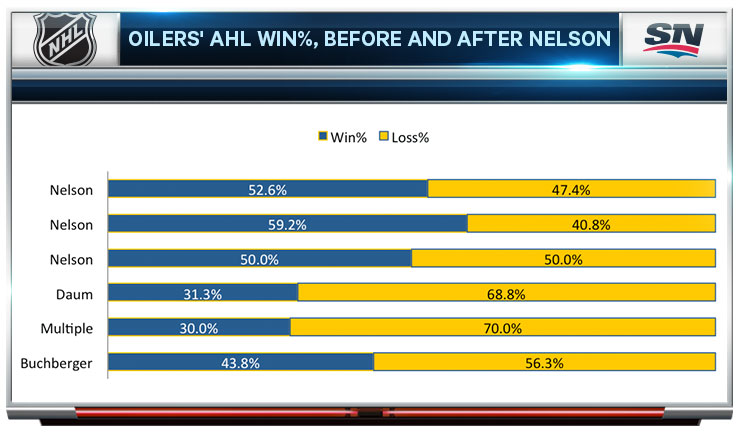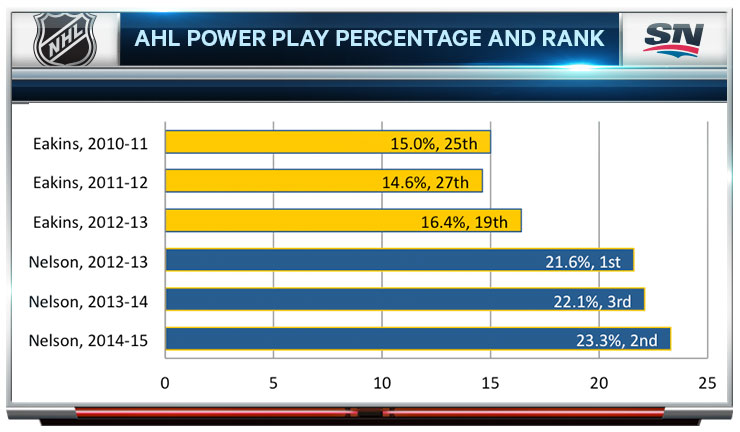On Monday, the Edmonton Oilers made head coach Dallas Eakins the fall guy for problems not of his making. At the press conference announcing Eakins’s departure, GM Craig MacTavish revealed that he would be a transitional coach for a short time; after that Todd Nelson, the head coach of Edmonton’s AHL affiliate, would take over on an interim basis.
Nelson doesn’t have the power to address the Oilers’ sizable problems at centre and on defence. And he’s going to be just as vulnerable to poor goaltending as his predecessor. But for a myriad of reasons, once Edmonton made the decision to make a coaching change Nelson was the right fit and he’s been hired for the right job.
Let’s start with that job description. Nelson is an interim head coach, which essentially means that the last half of the Oilers’ season is a prolonged job interview. Some would argue that Edmonton should have brought in a veteran, but the problem is that most veteran coaches have jobs at the moment; giving Nelson the interim tag allows the Oilers to defer a decision until the summer.
That lets them wait out the end-of-season firings of veteran coaches and allows them an opportunity to talk to candidates currently working as NHL assistant coaches or plying their trade overseas. It was logical to turn things over to an internal candidate and defer a permanent decision until the end of the season.
Of the internal candidates, Nelson was the most obvious choice. MacTavish has experience as a head coach, but the idea of a coach-GM simply isn’t workable in today’s NHL; this isn’t the 1980s. Craig Ramsay, who turns 64 in March, was the other choice, but he’s been tied to the team since the start of the season.
Nelson is also a compelling figure because he’s stepped into a dysfunctional organization and had success before. That dysfunctional organization? The Oklahoma City Barons, otherwise known as the Edmonton Oilers farm team, a club which was as bad in the AHL prior to Nelson’s hiring as the Oilers have been in the NHL.

Not all of that was Nelson, of course; the organization made some significant changes to the AHL roster, as it had in each of the three previous seasons. Even so, the team took a major step forward, going from winning less than one-third of its games to a .500 record in straight wins and losses (40-29-11 counting overtime and shootout losses separately). The Barons made the playoffs that year, as they have every year since, a run of success that looks even more impressive given that no AHL team solely operated by Edmonton had made the postseason since 2003.
There is also at least one area where Nelson’s influence in Edmonton should be felt immediately: the power play. As of Monday, the Oilers’ unit was clicking at a miserable 12.9 percent, good for 28th in the league. While the power play lacks some key pieces (such as a heavy shot from the point) that kind of performance isn’t acceptable given the offensive talent at the team’s disposal. Nelson, however, has a pretty good track record of making power plays work; his recent track record in the AHL compares very favourably to that of the departing Eakins.

Nelson is familiar with getting the most out of this particular group of players, too; the 2012-13 Barons ranked first in the league on the power play in no small part thanks to the presence of much of Edmonton’s young core during the NHL lockout. That team saw Justin Schultz win defenceman of the year thanks to a 34-game performance in which he recorded an incredible 48 points; he and Jordan Eberle (51 points) went back-and-forth for the AHL scoring lead the entire time they were down there together.
The black mark against Nelson is that AHL success is not the same as NHL success. Eakins may not have coached a strong power play down in the minors, but his Toronto Marlies were a pretty good team in the big picture, improving steadily under his watch and winning better than 55 percent of their games in each of his final two campaigns. For every highly-touted AHL coach who succeeds there are failures.
That’s why making Nelson the interim coach is the right move; it’s a risk-free trial for an Oilers team sitting so far back that its season is already over. If he’s the next Jon Cooper, he gets a long look here to show that he can do something with the current roster. If he isn’t, Edmonton can walk away from him and go shopping for a new coach in a candidate-rich summer environment. The Oilers have done a lot of things wrong, but once the decision was made to make a coaching change they hired the right man and gave him the right title.

